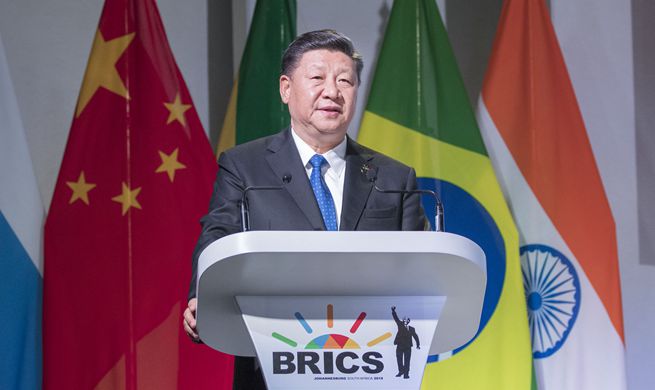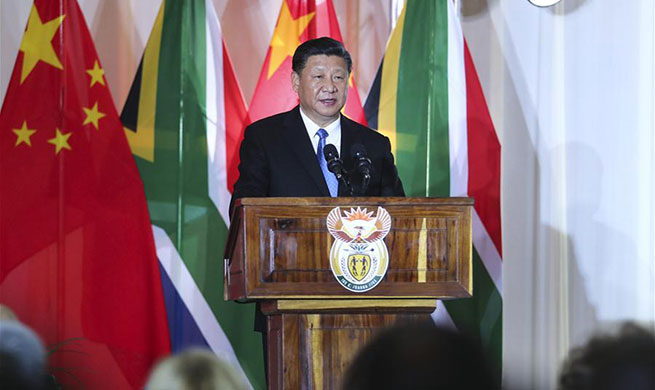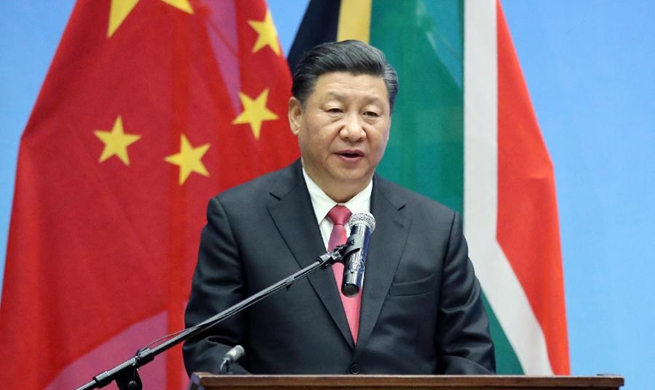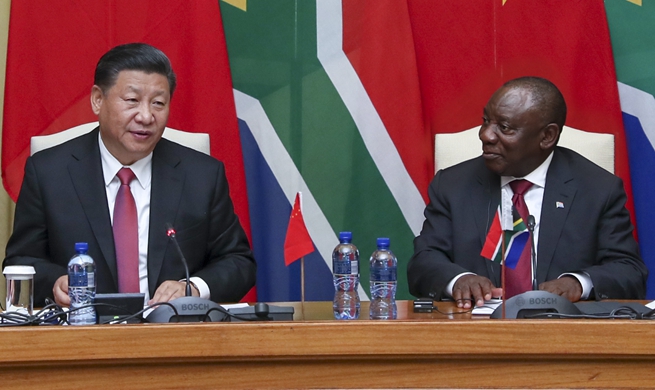BERLIN, July 26 (Xinhua) -- German business representatives and policymakers expressed hope on Thursday that talks between the European Union (EU) and the United States could mark the first step towards the de-escalation of a swelling trade conflict.
Speaking to press, Dieter Kempf, the president of the Federation of German Industries (BDI), described the meeting between EU Commission President Jean-Claude Juncker, EU trade commissioner Cecilia Malmstroem and U.S. President Donald Trump as an "important sign of de-escalation".
Hubertus Bardt, head of research at the German Economic Institute (IW), also commented positively on the meeting. "The Washington decisions now bring a chance for a course correction," a statement reads.
During the closely-watched talks in Washington, the EU secured a pledge from the United States to exempt it from further punitive tariffs on automotive imports as had been announced by Trump earlier.
Instead, the EU and U.S. would focus on launching negotiations for a program of mutual tariff reduction and reforms of the surveillance- and enforcement mechanisms of the World Trade Organization (WTO).
"The tariff-spiral in transatlantic trade seems to have been halted for now," Kempf commented on the development. However, he added that "deeds would now have to follow words" in order for the summit to become a lasting success.
The BDI noted that the EU would have to ensure the protection of the WTO as the "indispensable protector of free trade" and emphasize that Brussels would never accept illegal protectionist policies imposed under the mantle of national security.
At the same time, Kempf said that the BDI "expressly supports" announcements by Juncker and Trump to pursue a reduction of all industrial tariffs, as well as non-tariff barriers, in these economic sectors.
German minister for the economy Peter Altmaier also welcomed the outcome of the Washington summit on Thursday as a "great" negotiating result on both sides.
Writing on Twitter, Altmaier argued that the "breakthrough" achieved by Juncker and Trump could help "avoid a trade war & save millions of jobs!"
Nevertheless, the German Institute for Economic Research (DIW) cautioned against attaching too many expectations to the temporary easing of tensions in the trade conflict between Europe and America.
"So far, all we have seen is a de-escalation but no reason (for the EU) to relax its guard entirely. That new negotiations will be launched on tariff reduction does not yet mean that a trade war has been averted," DIW president Marcel Fratzscher said.
Although a watered-down version of the failed Transatlantic Trade and Investment Partnership (TTIP), limited to industrial goods, it was a relatively low-hanging fruit, Fratzscher stressed that the commitments made by Washington at this point remained "vague".
Additionally, the DIW president expressed concern that the announced reform of the WTO could be used by Trump to weaken, rather than strengthen, the Geneva-based organization.
Such a move would undermine multilateral governance in favor of one-sided bilateral "deals" on trade in which smaller, less prosperous countries enjoyed little leverage and were hence vulnerable to blackmail.
"The EU and federal government in Germany need to try to ensure that the beneficiaries (of a U.S.-EU trade agreement, note) are not just Europe and other industrial nations but that weaker developing nations in particular receive fair opportunities in global trade too," Fratzscher argued.
Echoing Fratzscher's skeptical stance, a statement by the Ifo Institute for Economic Research (Ifo) lamented "many short-term unclarities" in the wake of the summit between Juncker and Trump.
It was unlikely, for example that the large trade deficit for goods run by the U.S. with the EU would fall in response to more industrial tariff reductions without parallel structural reforms to improve export competitiveness.
"As a consequence, a key domestic policy issue of the U.S. president remains unsolved," Ifo trade expert Gabriel Felbermayr said.
Even if the trade pact pursued was just a significantly slimmed-down version of TTIP, sensitive topics in negotiations over its shape bore a "substantial risk" of sparking renewed conflicts between the EU and U.S.













